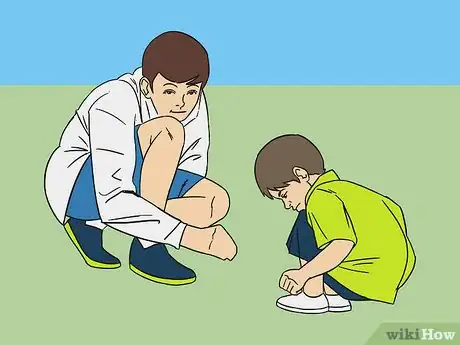This article was co-authored by Wits End Parenting. Wits End Parenting is a parent-coaching practice based in Berkeley, California specializing in strong-willed, “spirited” children with impulsivity, emotional volatility, difficulty “listening,” defiance, and aggression. Wits End Parenting's counselors incorporate positive discipline that is tailored to each child’s temperament while also providing long-term results, freeing parents from the need to continually re-invent their discipline strategies.
There are 10 references cited in this article, which can be found at the bottom of the page.
This article has been viewed 26,730 times.
Parents play a major role in teaching their children how to make friends.[1] However, some kids are naturally shy and may take longer to warm up to new people. It’s important to understand that shy kids may have a different approach to making friends than outgoing kids, and that's okay. Give them support and encouragement to help them gain confidence and feel more at ease around others. Help to set up opportunities for your kid to interact with others, but allow your child to navigate the steps towards friendship.
Steps
Setting Up Opportunities to Make Friends
-
1Talk with your child to see if they want your help with making friends. While most kids will be hesitant to admit that they want your help, assess if your child is actually bothered by their limited group of friends. Some shy or introverted children are happy with few or no friends.
- Helping your child to make friends may be anxiety-provoking for them. Pay attention to your child's actions and body language. They may be overwhelmed or frustrated if you work on making friends for them.
- Notice if your child seems generally happy and content. If your child has few or no friends but seems to be happy, think about how the activities that they enjoy may be more independent. They may like to have more alone time.
- Avoid making assumptions. Get their input before taking action with help.
-
2Teach your kid about the importance of friendships. Help your child understand what friendship means to you. Tell them what good friends do, and how to be a good friend in return. Make them feel like it's okay to have many friends or few friends, because it's the quality of the friendship that matters.[2]
- Be a role model for your child by displaying your healthy friendships.
- Focus on helping your child develop conversational skills, interpersonal skills, and emotional self-control in order to help them make friends on their own.[3]
- Teach them that friendships become more important as they grow older, and that friends help you to feel happier and supported.
- Discuss what makes a good friend, and what makes a bad friend.
- Help them to identify qualities in others that would make good friends such as reliability, kindness, understanding, similar interests or personalities, and trust.
Advertisement -
3Set up one-on-one playdates. Avoid overwhelming your child with lots of other kids, particularly if your kid is shy. Large social groups, even with three or four children, can seem intimidating for a shy kid. Focus more on one-on-one playdates with school or neighborhood kids.[4]
- If your kid is under seven or eight, you may take a more active role in setting up playdates.
- Provide encouragement to your older kids in less direct ways. Consider saying, "Want to invite a friend over this weekend? We could have a pizza night" or "Did you want to pick the movie for movie night this week? Maybe you could invite a friend over this time?"
- Allow your child to slowly feel comfortable in their environment and feel positive about their interactions with others so that they will begin to associate positivity with friendships.
-
4Find younger children for your kid to play with. Sometimes shy kids may feel more awkward or anxious around peers who are their same age. They may feel more at ease with younger kids. Younger kids may make them feel more welcome because they look up to older kids.
- Encourage them to play with neighborhood kids that may be younger. Invite your neighbors over for a get-together and help to introduce the kids to each other.
- Have your child grow more comfortable with others by interacting with other siblings, cousins, or relatives that are younger.
-
5Find after-school activities that your kid enjoys which require teamwork. Shy kids may need more encouragement to engage in team-oriented activities. Focus on team-oriented activities that they already have an interest in, rather than forcing them to do things you find more interesting. Sometimes structured interaction is more comfortable than unstructured interaction because there’s a common point of interest to focus on.
- For example, maybe your shy kid likes to do outdoor activities. You want to sign them up for little league, but they'd rather go hiking in nature. Focus on clubs like Boy Scouts or 4-H instead.
- Even if the activities aren't group-oriented all the time, it can help to teach your child about social interaction. Consider pottery classes, swimming lessons, or gymnastics.
Building Confidence
-
1Give your child chances to build social skills in public settings. Consider working with your child at home through role-playing first. By practicing ahead of time in a safe environment, your shy kid will likely feel more comfortable when talking in public.[5]
- For example, role-play with them about situations at the grocery store, in a park, at school, on a playground, and at family gatherings. Use different scenarios of when people or kids are more friendly and less friendly.
- Help to explain what to say or how to act if they encounter a difficult situation or person. But most of the scenarios should involve friendly encounters, so that it encourages them to act in public.
- When they are in public, help to remind them of what they learned and how to act more open and friendly.
-
2Help to model polite and outgoing behavior.[6] A child looks up to their parents and adults for guidance about what to do and how to act. Be a role model for positive and respectful behavior in a variety of settings, both at home and in public.[7]
- Show them how to share things and help others. Be a model for kindness towards others. Explain how helping others can often lead to friendships.
- Talk with a diverse array of people. Instead of being irritated by others, show your kids how to be relaxed and friendly. Talk with the people in a checkout line. Engage in conversation with other shoppers at a store. Be open to asking questions or giving advice to others in public.
-
3Avoid focusing on the negative things in your kid's life. If you’re constantly “checking in” on your child’s shy behaviors when they don’t have friends, you may make them feel even more like an outcast. Avoid constantly reminding them of the negative things they’re facing.[8]
- For example, if you’ve just picked up your child from school, avoid asking them things like, “So did you eat by yourself again today at lunch?” or “So did you stay in class at recess again?”
- Allow for more open-ended questions that lead to more details with time. For example, ask, “Did you have a good day?” or “How was recess today?” and then follow up with questions such as “What made it a difficult day?” or “What activities did you do at recess?”
- Be sure to monitor your own negativity as well. If you frequently mention the dangers of the world or speak negatively about others, your child may begin to view others as threatening and untrustworthy.
-
4Provide encouragement and reassurance to your kid. Children who feel loved, supported, and appreciated will have greater confidence to do new things and interact with new people. New people or environments will seem less scary when they feel reassured.[9]
- Build their confidence through words of encouragement such as, “You’ve got such great artistic talents. I bet other kids would want to see your work” or “You’re such as kind person. Helping others on the playground is great idea.”
- Give them physical affection through hugs. Make them feel comforted and loved with hugs on a regular basis.
Assessing Shyness
-
1Avoid labeling shyness as negative. Many people are shy, and are often simply born that way. Also, avoid thinking that a kid's shyness is an automatic problem.[10] While some kids are more outgoing with others, other kids take time to warm up to people.[11]
- See shyness as a part of a kid's personality traits. Some people are extroverted and others are introverted. It's okay to be either.
- Some children may just have a temperament style that is considered "slow to warm up," meaning they’re cautious around new people or places. Some children like to naturally explore their environment while others need greater encouragement and support.[12]
- Accept that not all children are the same. Shy kids actually tend to be better listeners and are less likely to get in trouble at school.
-
2Notice situations when the kid seems more shy. Understand how the social environment may impact your child's behavior. Think about the times when your kid is most shy and when they are most talkative. Help to cultivate situations that lead to more talkative times.
- Pay attention to how they act at home, at school, with other family members, and in public. When do they seem most relaxed and open? When do they seem least talkative?
- Help to recreate situations that make them feel more open and interested. Make sure to engage them in the activities, rather than inadvertently making them feel left out.
-
3Avoid forcing them to be extroverted. If you push your kid too soon, they will likely retreat or close off further from your efforts. This may be particularly difficult for you if you're more extroverted and talkative. Make sure to avoid putting them on the spot, as overwhelming them may lead to more avoidance of social situations in the future. Give kids space and a chance to express themselves at their own pace.[13]
- For example, let's say your friends or family are visiting your home. Your kid has been practicing piano and you want to show off the kid's skills to your guests. Without warning, you ask your child to play for the guests. The kid will likely run off if they're shy or be too nervous to play.
- As another example, rather than telling someone, "She's feeling shy," try to reframe it like, "She just likes getting to know people a little before talking to them."[14]
- Instead of pushing them suddenly while others are watching, talk privately with your child beforehand. Ask them if they would be willing to play. If they aren't yet ready, try small steps such as having them play in front of you or one other guest first, and then in front of a group of people.
-
4Determine when your shy kid may need extra support. Some shy kids are deep-thinking and cautious in their behaviors, but also have a solid self-concept. Other kids who are shy may need additional support and counseling to help them with their fears or anxieties. Your child may need professional advice through your kid's school or a counselor if the child continues to display these behaviors:[15]
- Persistent avoidance of school or people leading to school absences or missed events
- Avoidance of eye contact and making other people feel very uncomfortable in their presence
- Shyness that comes from a place of intense anxiety or anger, possibly due to abuse or trauma
- Very low self-esteem in which depression and anxiety appear on a regular basis
Expert Q&A
-
QuestionHow can I help my child make friends if they're shy?
 Wits End ParentingWits End Parenting is a parent-coaching practice based in Berkeley, California specializing in strong-willed, “spirited” children with impulsivity, emotional volatility, difficulty “listening,” defiance, and aggression. Wits End Parenting's counselors incorporate positive discipline that is tailored to each child’s temperament while also providing long-term results, freeing parents from the need to continually re-invent their discipline strategies.
Wits End ParentingWits End Parenting is a parent-coaching practice based in Berkeley, California specializing in strong-willed, “spirited” children with impulsivity, emotional volatility, difficulty “listening,” defiance, and aggression. Wits End Parenting's counselors incorporate positive discipline that is tailored to each child’s temperament while also providing long-term results, freeing parents from the need to continually re-invent their discipline strategies.
Parenting Specialists It's okay if your child is a little introverted, but it can help if you open up and talk with them frequently so they feel more comfortable talking.
It's okay if your child is a little introverted, but it can help if you open up and talk with them frequently so they feel more comfortable talking.
References
- ↑ https://www.healthychildren.org/English/family-life/work-play/Pages/What-Parents-Can-Do-to-Support-Friendships.aspx
- ↑ http://www.huffingtonpost.com/susan-stiffelman/8-tips-for-helping-shy-ki_b_5913864.html
- ↑ http://www.parentingscience.com/kids-make-friends.html
- ↑ https://www.care.com/c/stories/5176/is-your-child-not-making-friends-tips-for-so/
- ↑ http://childmind.org/article/kids-who-need-a-little-help-to-make-friends/
- ↑ Wits End Parenting. Parenting Specialists. Expert Interview. 5 March 2020.
- ↑ http://www.webmd.com/parenting/features/parent-shy-child#1
- ↑ http://www.huffingtonpost.com/susan-stiffelman/8-tips-for-helping-shy-ki_b_5913864.html
- ↑ http://www.webmd.com/parenting/features/parent-shy-child#2
- ↑ Wits End Parenting. Parenting Specialists. Expert Interview. 5 March 2020.
- ↑ http://www.webmd.com/parenting/features/parent-shy-child#1
- ↑ http://www.earlychildhoodnews.com/earlychildhood/article_view.aspx?ArticleID=303
- ↑ https://www.askdrsears.com/topics/parenting/child-rearing-and-development/8-ways-help-shy-child/
- ↑ Wits End Parenting. Parenting Specialists. Expert Interview. 5 March 2020.
- ↑ https://www.askdrsears.com/topics/parenting/child-rearing-and-development/8-ways-help-shy-child/








































































